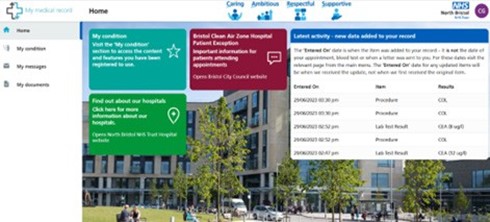Your guide to self-supported management and remote monitoring
Useful definitions:
- Colorectal is another word for bowel, colon, or rectum.
- CEA stands for carcinoembryonic antigen, which is a protein found in the blood.
- CT scan uses X-rays and a computer to create detailed images of the inside of the body.
- Endoscopy is the term for the camera used to visualise (see inside) the gastrointestinal tract.
- Colonoscopy and flexible sigmoidoscopy are used to view the lining of the large bowel.
- Supported self-management - enables you to take a leading role in your follow-up with support from the cancer support team.
- Remote monitoring – enables you and your clinical team to monitor your health and review your plan of care without needing to do this face-to-face.
Follow-up after colorectal cancer treatment
This page explains how the Colorectal team will monitor you following your colorectal cancer treatment.
Over the next 5 years you will have CT scans, a blood test called CEA, and endoscopic assessment of the remaining large bowel at set times.
To do this North Bristol NHS Trust (NBT) uses a secure website called My Medical Record (MMR). The website will give you access to your monitoring plan, colorectal test results, useful health and wellbeing information, and the ability to message the team. Using MMR reduces the need for routine follow-up hospital appointments.
Following your treatment, a member of the Colorectal nurse team will discuss your monitoring plan and introduce you to the website.
Here is a short film about MMR:
After watching this video, if you would like to use MMR we will provide you with login details. If you choose not to use MMR, your monitoring will continue with routine phone appointments.
What tests will you have?
CEA blood test:
- For the first 3 years you will have a test every 6 months.
- For the next 2 years you will have a test once a year.
CT scan of the abdomen and pelvis (CAP):
- Once a year around the time of your surgery for the first 2 years.
Some people may also have a colonoscopy or flexible sigmoidoscopy if required.
CEA can be raised in some patients with colorectal cancer so it is monitored following treatment. However, many other conditions can increase it.
Your CEA blood tests will be taken at your GP surgery or other community setting. You will be asked to arrange the blood test yourself. MMR will show your monitoring plan which tells you when the blood tests are due.
You will be able to see your results on the website, the Colorectal team will contact you if any action is needed.
CT scans and endoscopy appointments will be arranged by the Colorectal nurse team. You will receive an appointment to attend the hospital for these tests. The results will be available to you on MMR after they have been reviewed by the Colorectal nurse team.
- If your results are normal, you will receive a letter on MMR confirming the result and the date when your next test it due.
- If your test results are abnormal and require further review, a member of your Colorectal nurse team will contact you and advise you of the next steps.
We appreciate that having undergone treatment for colorectal cancer you may have queries from time to time. During the monitoring period you can contact the Colorectal team by phone or using MMR secure messaging.
Depending on your query the Colorectal team will either give advice, find out more information, or arrange a hospital appointment.
Picture of the My Medical Record homepage

Useful information available on MMR
Local and national information including websites, leaflets, and videos are available on MMR. They cover topics such as:
- Managing the side effects of treatment.
- Healthy lifestyle.
- Support groups.
How to contact us
Clinical Nurse Specialist and Cancer Support Worker
0117 414 0514
© North Bristol NHS Trust. This edition published October 2024. Review due October 2027. NBT003692
Support your local hospital charity

See the impact we make across our hospitals and how you can be a part of it.
